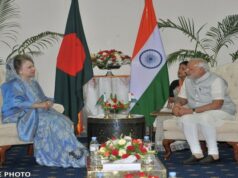A 4.6 magnitude low-intensity earthquake in northern Iran’s Semnan province over the weekend, triggered speculation about a nuclear test by the country’s clerical leadership.
As usual, social media was first-off the mark with one user on X commenting “Iran has gone nuclear. They used test bombs 10-km below the surface … to ensure minimum radiation exposure and it resulted in a 4.6 magnitude earthquake recorded by seismographs.”
Semnan borders Tehran home to a nuclear research reactor, also Fordow and Natanz where there are two uranium enrichment plants.
Another X user posted “In Feb 2013 an earthquake in N Korea turned out to be a nuclear test. A Nov 2017 earthquake was also dubbed a nuclear test. Is Iran capable enough to gather fissile material in a week’s time?
Neither the Federation of American Scientists (FAS) nor the Arms Control Association (ACA) list Iran as a country with nuclear weapons.
But it does figure in the ACA’s category of States of Immediate Proliferation Concern with the description “It has developed the necessary capacities to build nuclear weapons. Tehran has threatened to withdraw from the NPT and to pursue a nuclear deterrent if its security considerations shift.”
The ACA notes that in 2024, the US Worldwide Threat Assessment, said “Iran has not resumed key nuclear weapons related activities but its nuclear advances better position it to develop nuclear weapons if the decision is made to do so.”
“Iran has accumulated enough uranium enriched to 60% to build nuclear weapons, but the warhead would be large, unwieldy …
“Iranian officials began suggesting after an April 2024 attack on Israel that the country will rethink its nuclear doctrine if security conditions change or its nuclear facilities are attacked.”
What about Israel? This is where the hypocrisy of the international nuclear order becomes evident. All the pressure and sanctions are focused on Iran, but Israel gets a clean chit even though it has nukes and has not signed the Non-Proliferation Treaty.
The FAS in its 2024 map of Estimated Global Nuclear Warhead Inventories, says Israel has 90 nuclear weapons. It makes the telling observation that “The information available for each country varies greatly, ranging from the most transparent nuclear weapon state (US) to the most opaque (Israel)”.
In other words, the size of Israel’s stockpile is uncertain. It may have more or it may have less. Nor is it clear how many are deployed.
The ACA also gives the figure 90 for Israel’s nuclear warheads adding the caveat “With fissile material stockpiles for about 200 weapons”.
ACA says “Israel does not admit nor deny having nuclear weapons and states that it will not be the first to introduce nuclear weapons in the Middle East. Nevertheless, Israel is universally believed to possess nuclear arms stored in a partially disassembled state, although it is unclear exactly how many.”
As recently as June this year, the Stockholm International Peace Research Institute (SIPRI) said in a report that Israel was upgrading its nuclear weapons systems, modernising nuclear production facilities in the south, likely near Dimona.
In its annual report which reviewed developments through 2023 to Jan 2024, it said “There was evidence Israel was in the process of upgrading its nuclear reactor in the southern town of Dimona.”
Israel maintains a policy of nuclear ambiguity but SIPRI warns that the standoff with Iran exemplifies the dangerous trend of the prominence of nuclear weapons in international relations. It says the risk of escalation remains dangerously high.
Thirty eight years in journalism, widely travelled, history buff with a preference for Old Monk Rum. Current interest/focus spans China, Technology and Trade. Recent reads: Steven Colls Directorate S and Alexander Frater's Chasing the Monsoon. Netflix/Prime video junkie. Loves animal videos on Facebook. Reluctant tweeter.




